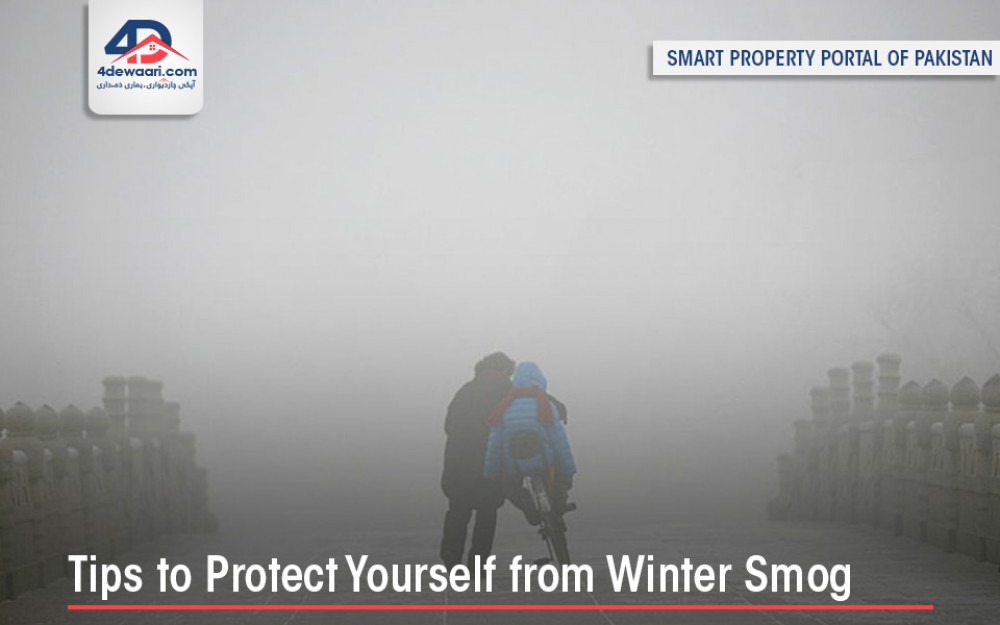How To Protect Yourself From Smog In Winters?
Given the plague-ridden era we live in, we need to be extra careful about our health. The World Health Organization (WHO) has ranked air pollution as one of the Top Ten Preventable Causes Of Death. Air Pollution is a major problem around the globe. According to recent reports, more than 90% of the world's population breathes in air that violates air quality guidelines set by the World Health Organization, increasing their risk of lung cancer and respiratory infections, but also conditions including stroke, cardiovascular disease, and chronic obstructive pulmonary disease.
What is smog?
The term smog describes a mixture of emissions under specific climate conditions. These include industrial pollutants, car and other vehicle pollutants, open burning, incinerators, etc.
Winter comes with coldness, smog, and many other things like mosquito bites especially increased cases of dengue fever, as we have discussed Important Tips To Get Rid of Dengue previously, in this article we shall discuss Winter Smog Prevention and How To Keep Yourself Safe From Smog?
How does smog affect your health?
It is of course hazardous but how? According to the Environmental Protection Agency (EPA), it can be dangerous to breathe in too much smog. Smog contains a pollutant called ozone, and elevated ozone levels can have a variety of negative effects on your lungs. Smog can lead to several different types of health problems. These include:
- Worsening of asthma symptoms.
- Eye irritation.
- Difficulty breathing and lung damage.
- High levels of ozone can irritate your respiratory system, harm your lungs even after symptoms disappear.
How can you protect yourself from smog?
Here are some necessary instructions.
Limit your Outdoor Activities
Try to avoid going out unnecessarily and avoid exercising in smoggy conditions, particularly at midday when ground ozone levels are at their highest. Makeshift and try to change the times you exercise to morning or evening or exercise inside.
Cleaning Indoor Air Quality
Whether you have a portable or Central Air Cleaning System, an Air Purifier can reduce concentrations of Indoor Air Pollutants, of either outdoor or indoor origin. Regardless of it is an air purifier or an Air Cleaner, the most important components of this type of machine are its Air Filters. These filters remove smaller allergens like dust, smoke, chemicals, asbestos, pollen, and pet dander. A Vacuum Cleaner is also a useful option. Like the Uses and Importance of Solar Energy For Homes, these filters and air purifiers for Air Pollution Prevention have also become of vital importance in our daily use for a healthy life. In this regard, an Activated Carbon Filter uses a chemical reaction called adsorption to pull odors, gases, and vapors from the air. Although they are not technically filters, yet they are designed to remove impurities from the air.
Other Useful Tips
- Replace a regular light bulb with a compact fluorescent light bulb that eliminates about 136 kilograms of carbon dioxide a year.
- Surround yourself with clean air, close windows, and use air conditioners and air purifiers.
- Choose effective face protection.
- The masks designed for industrial use are the most effective.
- Clean your home.
- Wet mopping of floors reduces dust. It is also advised that people sleep in a clean room, with as few windows and doors as possible to further reduce exposure as they sleep.
- Stay hydrated.
- Intake of water and other healthy juices will help in cleaning your body and blood from harmful pollutants.
Important Tips You Must Follow:
Try to Limit Emissions
Given the Global Environmental Degradation, we need to work together to develop systems that help us improve our Air Quality. We should, for the greater good, try to use Public Transportation instead of driving and work together to Reduce Emissions. Instead of waiting for governments to act, there are several personal actions that can be taken by individuals to effectively reduce the risks of adverse health effects from air pollution.
Check Daily Air-quality Alerts
You live in the age of technology, make use of it, you can protect yourself and your family by checking the daily Air Quality Index and planning your outdoor activities appropriately. When pollution levels are high, avoid exercising near high-traffic areas, or preferably exercise inside. Limit the amount of time your children play outdoors and especially the peak hours.
Don’t Burn Wood or Trash
It is an established fact that burning firewood and trash are among the major sources of particle pollution in many parts of our country. So, try not to burn them and if necessity makes you do so, try to go for the alternatives.
Smog is quite reducible is we become a bit responsible and everyone can do their part to reduce smog by changing a few behaviors, such as:
- Drive less, walk, carpool, and use public transportation whenever possible.
- Take care of cars mechanically. Getting regular tune-ups, changing the oil on schedule, and inflating tires to the proper level can improve gas mileage and reduce emissions.
- Fuel up during the cooler hours of the day, night, or early morning. This prevents gas fumes from heating up and producing ozone.
- Avoid products that release high levels of VOCs. For example, use low-VOC paints.
- Avoid gas-powered yard equipment, like lawnmowers. Use electric appliances instead.
Instead of looking towards the government to be more active, the pollution in your home is easy enough to deal with considering it is an environment you can monitor more closely. It is often best to know what it is that is affecting the indoor air quality first and what kind of pollution it is that is in your home. The different things that cause pollution in your home include:
Poor Ventilation, Humidity Levels, other gases such as radon, carbon monoxide, and ground-level ozone, as well as particle pollution. As per the studies, of all these causes, radon is perhaps the most dangerous to affect Indoor Air Quality considering the fact that it is a tasteless, colorless, and odorless gas. It is radioactive too. Radon is most dangerous because there is no way for you to detect whether or not there is a high concentration of radon in your home. Although it is present in almost every home, the concentration levels are usually too low to cause any harm in terms of indoor air pollution but certainly mitigable.
Lastly, it is health that is paramount to all. Health is wealth, as they say, so try to observe these tips diligently to ensure safety and good health!

















